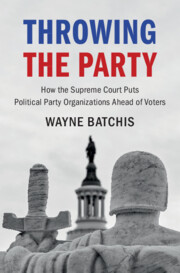Book contents
- Throwing the Party
- Cambridge Studies on Civil Rights and Civil Liberties
- Throwing the Party
- Copyright page
- Contents
- Preface
- Acknowledgments
- Part I Foundations
- Part II Party Primaries
- Part III The Party, the Court, and Campaign Finance Law
- Part IV Passé Equal Protection and a Way Forward
- 11 Party and Equality
- 12 The Political Question
- 13 A Potential Solution
- 14 Conclusion
- Index
11 - Party and Equality
from Part IV - Passé Equal Protection and a Way Forward
Published online by Cambridge University Press: 16 June 2022
- Throwing the Party
- Cambridge Studies on Civil Rights and Civil Liberties
- Throwing the Party
- Copyright page
- Contents
- Preface
- Acknowledgments
- Part I Foundations
- Part II Party Primaries
- Part III The Party, the Court, and Campaign Finance Law
- Part IV Passé Equal Protection and a Way Forward
- 11 Party and Equality
- 12 The Political Question
- 13 A Potential Solution
- 14 Conclusion
- Index
Summary
The language of the Equal Protection Clause of the Fourteenth Amendment is unequivocal. It commands: “No State shall … deny to any person within its jurisdiction the equal protection of the laws.”1 Yet, listening to the contemporary Supreme Court’s political party jurisprudence, its voice has been relatively silent. Granted, applying equal protection principles to an inconsistently defined concept like political parties – as we saw in the First Amendment domain – poses many complications and contradictions. This is because, on the most fundamental level, equality for one component of party might mean inequality for another. A law that provides for equal treatment for individual voters – the party in the electorate – may affect similarly situated party organizations or members of the party in government differently. One might imagine, for example, the establishment of a state nonpartisan redistricting commission – designed to address the inequality endemic in a system rife with partisan gerrymandering – that prohibits, or limits the number of, commissioners who are affiliated with either of the two major parties, therefore “unequally” discriminating against party members. In short, the Equal Protection Clause is just as susceptible to the confounding attributes of the major American political party as the First Amendment. Nonetheless, I shall argue that equal protection is preferable to a First Amendment rubric.
- Type
- Chapter
- Information
- Throwing the PartyHow the Supreme Court Puts Political Party Organizations Ahead of Voters, pp. 185 - 206Publisher: Cambridge University PressPrint publication year: 2022

